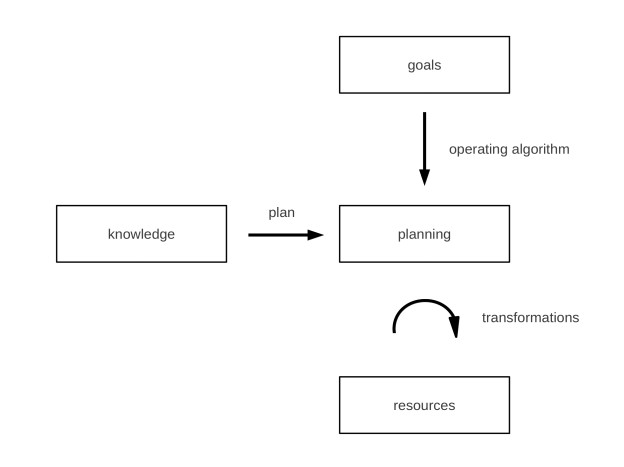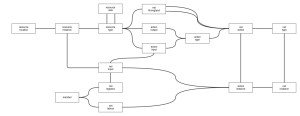published in leadership and change magazine
Kyle MacDonald swapped one red paperclip for a house (and he wrote a book about it, see http://en.wikipedia.org/wiki/One_red_paperclip). So swapping might just be the answer to all your problems! But what if everybody would be swapping and nobody would produce any of the stuff we want to swap? Below I will argue that swapping in fact is the root of today’s problems. And the opposite of swap is the answer to these problems: share.
I dream about a world in which we are all welcome. Many of us share that dream but it seems hard to materialise it. So what is the problem we want to solve? And what is the problem with solving that problem?
To start with the latter question: whereas most people have for strategy to confine the problem to a specific area (some people fight climate change while other people fight hunger), in contrast my strategy is to make a distinction between the rules needed to describe a utopian solution and the rules needed to adapt this utopia to real life people. Lately the importance of an appealing utopia has been recognised, but there is no concensus on what this utopia looks like yet. Below I will deduce such a utopia.
So what is the problem we want to solve? It is not one problem but a multitude of interlocking problems: climate, hunger, you know the list. But when looking closer I believe that in fact there is one and only one true cause to all the world’s problems. I will state my analysis affirmatively:
With everything we do we can take each other’s concerns more into account than we do now.
Please stop reading and contemplate this statement. Is it really true that if everybody would take alle relevant concerns into account when taking a decision that then all the world’s problems would vanish? And even if this were true, is this at all possible? Concerns tend to conflict so taking all concerns into account seems logically inconsistent. Here my definition of freedom comes in handy:
Freedom is a duty, it’s not a right. Freedom is the duty to take care of your fellow.
Again some contemplation is advised here. Please note that if I take up my duty to take care of you, then I create for you the possibility to take care of your fellow. So this definition of freedom is viral: a person is free when he makes his fellow free. This definition of freedom brings within reach the promise contained in what Gandhi said:
There is enough for everybody’s need, but not enough for anybody’s greed.
There is scientific support for this statement. For instance, the agricultural university of Wageningen has calculated that this planet has enough capacity to feed 177 billion people. So if each of us only takes what he needs (and why would you take more?) then there is enough for everybody, hence there will be no conflicting concerns. So yes, I believe it is possible to take all concerns into account. There is only one precondition: freedom – the duty to take care of your fellow. This might be possible, but do we want this? To answer this question please listen to Jesus who said:
There is more happiness in giving than in receiving.
Again there is scientific support for this statement. Frankly I believe the whole world is in a collective post traumatic stress preventing us from feeling that sharing is what we really want. I conclude: it is possible to take care of your fellow, and it makes you happy!
In order to operationalise the above I propose the following analysis framework. For me economy is about this planets resources and our transformations of these resources. We use a planning to transform these resources and we don’t do that at random but we have all kinds of goals that we want to achieve (like food, shelter, education, care and the like). Now in this framework I define economy as the algorithm that translates our goals into our planning. Note that the amount of goals actually achieved by our current planning is an interesting candidate for Gross Global Happiness.
Now any such algorithm basically answers two questions:
1. Who does what?
2. Who takes what?
Next I observe that our culture has two memes (paradigms) from which to build such an algorithm. The oldest and still widest in use is the care principle, when people take care of their fellow they answer the above questions as follows:
1. I do what I can, what is good for us, what inspires me.
2. I take what I need, what is good for me, what inspires me.
But when several millenia ago tribes started to interact with each other and experienced their interaction partners as different from themselves (this is the heart of Charles Eisenstein’s analysis) they formulated other answers. The second meme is the market principle, the aim of a negotiation is:
1. I do the least possible
2. I take the most possible
We are used to negotiate so the care principle seems remote to us. But this is not true, each of us uses the care principle every day, at home. The care principle describes how you plan together with your family at the kitchen table. It is true that the circle of people we take care of has become smaller and smaller over the past millenia, form your tribe at large to just your family (this is what we call individualisation), but the care principle is still in our culture.
If we stick to the care principle we only take what we need. Hence there is enough for everybody. Hence there is abundance. Hence there is no need for a notion like ownership. Hence we share. But what and how do we share? To answer this last question once again we look at the analysis framework. It is built out of five constituents:
resources
labour
knowledge
goals
planning
Here’s what and how to share. We can take care of each other by sharing these five things. Note that sharing these five things is an operationalisation of saying that you are solidary with your fellow, which in turn is a way of taking care of your fellow.
When two actors interact they can choose how they relate to each other, the ultimate choice is between the care and the market principle. The market principle is about winning or loosing. The care principle is about finding your place in a group or society. When you are in a group, you want to fit in (unless you are a psychopath). You do that by forming a fabric with the other members of the group. The purpose of the group determines from which material the fabric is made. In the case of economy interactions are the material. I expressly do not use the word transaction here for this word can also refer to the notion of trade which from my perspective, like swap, is only one possible incarnation of interaction.
So what is the problem with swapping? When people use the care principle the resulting exchanges are in balance, but when people use the market principle the resulting exchanges are out of balance. For instance taking as much as you need results in scarcity. Now to repair this disbalance we use the quid pro quo principle and therefore we swap. But the outcome of the quid pro quo protocol is determined by the power of it’s users, not by their capacities and needs. So when we swap we don’t take our responsibility to take all relevant concerns into account and transaction costs arise. In fact, lack of responsibility is already facilitated by ownership: I don’t have to lend you my car even if you desperately need it, just because it’s mine. Likewise we deprive the hungry from food. While when you embrace the care principle you are responsible and see yourself as the steward of your car instead of the owner and you will share it. The happy message is that the care principle permits us to devote our energy to real value instead of transaction costs.
Finally I’d like to come back to the question: How to adapt the utopia to real life people? This is where there is lots of work to be done and many solutions are possible. This is the field where we can share our experience and learn from each other. In fact many of the initiatives aiming at making the world a better place to live are each in their own unique way an adaptation of the utopia outlined above. These adaptations are all about trust, they can be conceived of as rules designed to manage (lack of) trust.
Currently I am designing a standard (like html/http) to facilitate sharing. It will be founded on design and engeneering methodology of organisations. You are invited to use the standard and add your adaptations. This project goes by the name of search & share.

